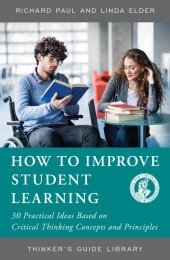How to Improve Student Learning: 30 Practical Ideas Based on Critical Thinking Concepts and Principles
Contact Info for Bloomsbury:
- For questions about orders you have already placed, email weborders@mpsvirginia.com or telephone 888-330-8477, ext. 7527.
- For questions about eBook purchases or pre-orders, email contact@bloomsbury.com.
- For general enquiries not related to online orders, call 1 212-419-5300 or email contact@bloomsbury.com.
Critical thinking pioneer Richard Paul and educational psychologist Linda Elder draw upon decades of experience to lay out thirty methods for improving student comprehension and engagement in any area of study. Teachers and faculty at all levels will find these strategies easy to integrate into the teaching and learning process, and, when integrated, will see students begin to take ownership of their learning.
This guide builds on The Thinker's Guide to Active and Cooperative Learning and cultivates student development as encouraged in the Thinker's Guide for Students on How to Study and Learn a Discipline.
As part of the Thinker’s Guide Library, this book advances the mission of the Foundation for Critical Thinking to promote fairminded critical societies through cultivating essential intellectual abilities and virtues across every field of study across world.
Pages: 48 • Trim: 6 x 8
978-0-944583-55-5 • Paperback • January 2014
978-1-5381-3385-9 • eBook • June 2019
Series:
Thinker's Guide Library
$25.20
Additional Information About:
How to Improve Student Learning: 30 Practical Ideas Based on Critical Thinking Concepts and Principles
This guide presents 30 instructional ideas based on the goal of teaching all subjects so that, as a consequence, students take ownership of the most basic principles and concepts of the subject. Most of our suggestions represent possible teaching strategies. They are based on a vision of instruction implied by critical thinking and an analysis of the weaknesses typically found in most traditional didactic lecture/quiz/test formats of instruction.
Students should master fundamental concepts and principles before they attempt to learn more advanced concepts. If class time is focused on helping students perform well on these foundational activities, we feel confident that the goals of most instruction will be achieved.
Our goal is not to dictate to you, but to provide you with possible strategies with which to experiment. The specific suggestions we recommend represent methods and strategies we have developed and tested with our students. Judge for yourself their plausibility. Test them for their practicality. Those that work (i.e., improve instruction) keep; those that do not work, abandon or redesign.
Contents include:
- Encourage students to think—quite explicitly—about their thinking
- Encourage students to think of content as a form of thinking
- Use engaged lecture
- Make the point that the content is a SYSTEM of interconnected ideas
- Discuss the textbook as the thinking of the author
- Make the course “work-intensive” for the students, but not for you
- Relate content whenever possible to issues and problems and practical situations in the lives of your students
- Design instruction so that students engage in routine practice in internalizing and applying the concepts they are learning (and in evaluating their understanding of each)
- Routinely ask questions that probe student understanding of the content
- Teach students how to assess their writing
- Teach students how to assess their listening
- Teach students how to assess their speaking
- Teach students how to assess their reading
